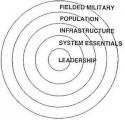I would have to say that it wouldnt work in Iraq, not now. Perhaps if we had done it right from the start, it may have helped. But now, with Iran and Syria taking such an active role, I doubt it would make a difference. And the sh*theads prefer IEDs and EFPs to small arms fire anyway, especially when attacking Americans. Thats what we need to take away from them. And how does that saying go? "When fighting Iraqis, the safest place to be is where they're aiming." Not really true anymore, I think, but the insurgents are generally lousy marksmen. But they sure can hide an IED.
There seems to be increasing instances of civilians chasing out some insurgent groups, or fighting them. The people defending themselves is what we want, since we are unwilling or incapable of doing it 100% ourselves. I would say it would be great if we could organize some neighborhood watches, but those Iraqis have a tendency to turn themselves into full blown militias. Now, disarming the militias would probably also be a futile effort, but giving it a shot and banning the public carry of weapons, might help with that whole issue.







Bookmarks